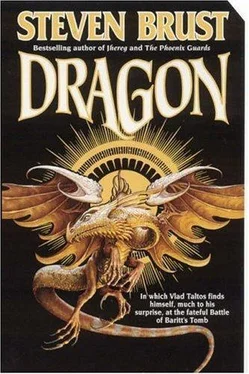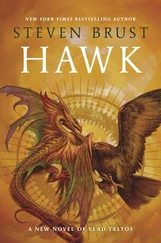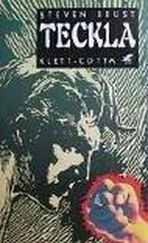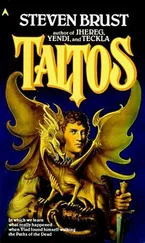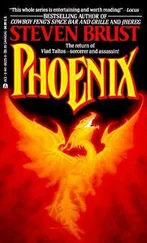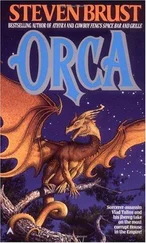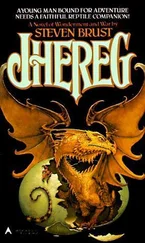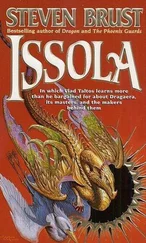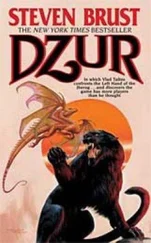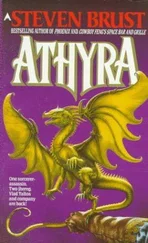Steven Brust - Dragon
Здесь есть возможность читать онлайн «Steven Brust - Dragon» весь текст электронной книги совершенно бесплатно (целиком полную версию без сокращений). В некоторых случаях можно слушать аудио, скачать через торрент в формате fb2 и присутствует краткое содержание. Жанр: Книги. Описание произведения, (предисловие) а так же отзывы посетителей доступны на портале библиотеки ЛибКат.
- Название:Dragon
- Автор:
- Жанр:
- Год:неизвестен
- ISBN:нет данных
- Рейтинг книги:3 / 5. Голосов: 1
-
Избранное:Добавить в избранное
- Отзывы:
-
Ваша оценка:
- 60
- 1
- 2
- 3
- 4
- 5
Dragon: краткое содержание, описание и аннотация
Предлагаем к чтению аннотацию, описание, краткое содержание или предисловие (зависит от того, что написал сам автор книги «Dragon»). Если вы не нашли необходимую информацию о книге — напишите в комментариях, мы постараемся отыскать её.
Dragon — читать онлайн бесплатно полную книгу (весь текст) целиком
Ниже представлен текст книги, разбитый по страницам. Система сохранения места последней прочитанной страницы, позволяет с удобством читать онлайн бесплатно книгу «Dragon», без необходимости каждый раз заново искать на чём Вы остановились. Поставьте закладку, и сможете в любой момент перейти на страницу, на которой закончили чтение.
Интервал:
Закладка:
"How many tricks do you use in your work?"
"Huh? I'll use a trick any time I think I can get away with it."
"So will I," said Sethra Lavode.
"But you usually don't?"
"Tricks, feints, sneak attacks, night attacks, they all work better if they're on a smaller scale. A unit, maybe a company, that's about it. Once you have anything larger, the chances for miscommunication and mistake become too great. And there's always more of a chance for error on attack than defending even in the most simple operations, so if you add something tricky it gets much worse. That's one reason I prefer to defend whenever possible."
"So that's why we kept holding positions and then retreating after we'd won?"
"Those skirmishes you're talking about"
"Skirmishes?"
"All right, Vlad. Those battles, then, that you won, you couldn't have actually won if you had remained. Fornia wouldn't have attacked if he hadn't been pretty sure he could overrun those positions eventually. We had to keep drawing him after us."
"Well, I suppose that counts as a trick, then."
"Maybe. Except, of course, that he knew very well what I was doing."
"Then why did he do what we wanted?"
"Because it was what he wanted, too. He wanted to try to get past our advance positions so he could divide our forces, which would have put me in a very uncomfortable position. It was a race, if you like. I needed to hold him off long enough for all of our forces to be in position; he needed to break through and separate us so we couldn't combine. And then, of course, the big, decisive engagement. However much planning you do, you don't really know until the armies meet and have it out. Even if your position looks perfect on paper, or even if it looks utterly untenable, you don't know until someone calls for an attack and the fight happens."
"Okay," I said. I tried to phrase my next question, then gave up just as she figured it out.
"The reason," she said, "that I have been successful is that I pay attention to details. The fewer details you miss, the greater your chances of winning."
"Well," I said. "That much is rather like assassination. Or so I've heard."
"I don't doubt it. It means keeping open lines of retreat and communications, and always knowing how you're going to feed and water the troops, and where they'll be camping, and what sort of ground they'll be crossing at every point, and the nature of your officers and where their strengths and weaknesses are, and how much dependence to place on which intelligence reports, and how far to push a particular victory, and how to salvage as much as possible from a given defeat, and so on and on and on. The detailsthe little things that lead to your peace, instead of the enemy's."
"Lead to peace?"
"Peace is the goal of war. Didn't you know that?"
"Uh … "
"Come, Vlad. Until there is peace, you haven't won. That is, you haven't accomplished your goals. On the other hand, it is worth remembering that, until there is peace, you also haven't lost."
"I guess I hadn't looked at it that way."
"You have never had to."
"Yeah, I suppose."
"The other reason I've been successful, I think, is that I'm very aggressive. And of course, my reputation helps. They think of me as being a great general, which makes the enemy afraid to be aggressive, which makes me a great general." She laughed a little. "But my usual approach is to give the enemy every chance to make a mistake, and then I punish him when he does, and the biggest mistake may be not to be aggressive enough, which is one mistake I never make."
"Aggressive on defense?"
"Certainly, Vlad. After all, it's always the defender who starts the war."
"Excuse me? Then it was Fornia who started the war with Morrolan?"
"Yes, indeed. That made him the defender, and that was why so much of my effort was involved in bringing him over to the attack."
I shook my head. "I don't see how it is that the defender starts the war."
"It isn't that complicated. The attacker doesn't want war. The attacker wants to conquer. If the defender would simply allow him to do so there would be no war."
"Uh … Sethra, I think there's something wrong with your logic."
"No," she said. "There isn't. It's counterintuitive, but it isn't wrong."
I thought all that over, remembering the battles and the retreats and the marches, and I said, "Assassination is easier. Or so I've heard."
She smiled and made no answer.
But that, as I said, was months later. At the time I just sat in camp along with everyone else, stood picket duty, marched, and griped. I think of that period as "the long march," although it was made clear to me that it wasn't long by anyone's standards except mine. I don't know exactly where we marchedI keep meaning to find a map and trace the routebut we usually had the Eastern River on our left, and we always had the Eastern Mountains on our right, and we kept going north; and then one day we turned around for no apparent reason and headed back south, almost exactly retracing our steps. No one except me, it seemed, found that infuriating, but I was annoyed enough to make up for the rest of them. My comments on the subject met with shrugs and puzzled looks until I stopped talking about it.
The weather for the most part stayed dry and cold. The cold wasn't too bad, because marching kept me warm, but I learned that dry wasn't all that much better than raining, because we were now passing through an area that hadn't seen any rain in some time, and so whenever we were on a road, which was most of the time, the troops in front kicked up dust that we had to eat all dayeven worse than before. Dust so thick you walked with your cap down and tried to keep your mouth closed, but you couldn't because your nose was plugged up. A few of my comrades had handkerchiefs over their mouths and noses; I tried that, but breathing became difficult so I stopped. Periodically someone would conjure up a cross breeze just to give us some relief, and even I took my turn at it, but we couldn't keep it going all day without a major weather-working, which was expressly forbidden by the Captainsomething about interfering with "stated objectives of the Brigade."
Excitement, what there was of it, came in the form of raids from the enemy, usually directed at the supply trains that came along several miles behind us. We would hear about them because we'd suddenly be ordered to halt, we'd have to take battle positions, and then we'd wait, and then we'd be ordered back in line and we'd set off marching again.
Then, one day, we made a sharp turn, put our backs to the river, and headed toward the mountains. There began to be a feeling of urgency, or maybe purpose is a better word, but I'm not sure where it came from. It grew colder as we climbed still higher, and the Eastern Mountains loomed ever larger. One peak in particular seemed to be our destination; a very tall, reddish-looking mountain with, it appeared, nothing whatsoever growing on its side. One evening, before the light failed, we stopped a few miles away from it, and I saw just how steep it was; it seemed to rise straight up from the ground, its top lost in the overcast.
The funny thing was, I didn't recognize it until the next day, when, after only a two-hour march we reached its foot, and Loiosh dived into my cloak with a psychic squeal, and then I looked around and said, "I'll be damned."
"Then don't get killed," said Virt. "But what is it this time?"
"I know where we are."
"That's good. Where are we?"
"That piece of rock," I said, "is Baritt's Tomb."
She nodded and looked around the area: a few hills here and there, and off to the southwest a flat plain covered with rocks and low grass, then a tall hill beyond. I could suddenly imagine warriors on each of those hills, and others charging across the plain.
Читать дальшеИнтервал:
Закладка:
Похожие книги на «Dragon»
Представляем Вашему вниманию похожие книги на «Dragon» списком для выбора. Мы отобрали схожую по названию и смыслу литературу в надежде предоставить читателям больше вариантов отыскать новые, интересные, ещё непрочитанные произведения.
Обсуждение, отзывы о книге «Dragon» и просто собственные мнения читателей. Оставьте ваши комментарии, напишите, что Вы думаете о произведении, его смысле или главных героях. Укажите что конкретно понравилось, а что нет, и почему Вы так считаете.
